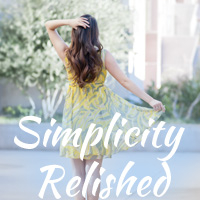The simple living movement often appears to be very much about the self.
Simplifying one’s life is often motivated by the desire to achieve goals, enjoy experiences, and generally feel happier. There’s nothing wrong with this– in fact, it is vital for us to prioritize what we love most– but within it also lies the challenge of whether simple living can have an impact outside of our own lives.
Can simple living be a selfless decision, too?
What does it mean to live simply– not just for yourself, but for others? What does it mean to live simply for the world’s benefit?
I believe that simple living can have a direct impact on our friends and on communities outside of our reach, and it is often what keeps me going when I would rather succumb to the temptation to consume. Simplifying your life will be good for you; but it will also be good for so many others.

7 Unselfish Reasons to Simplify Your Life
You’ll be more focused on others.
One of the most incredible things about simplifying my life (and for me, simplifying my wardrobe) was that as I began to care less about my stuff, I began to care more about the people around me. When I spent so much time researching and shopping the latest trends, I could only listen with half a heart to friends who were trying to get my attention. We can only focus on so many things at once; letting go of the excess allows us to focus on people, not stuff.
You’ll be more aware of need.
When you strip your life down to the essentials– and choose to live with less– you become more aware of what a basic need really is. And in that process, rather than chasing the next upgrade, you become more aware of those whose needs are not met at all. When we quit keeping up with the Joneses (or whoever the ideal may be for you), we start seeing the nobodies of our society. We start to see them, listen to them, and empathize with them.
You’ll create less waste.
Decluttering is not exactly good for the environment, but it is often the necessary start toward a commitment to consume less. Once you declutter, you learn to de-own, which means that you will find yourself using and replacing fewer items. In addition to having to throw away items that were purchased on impulse, so many products come in packaging that bulks up our recycling bins (if not the dumpster). Forgoing unnecessary acquisitions over a long period of time can save tons (literally) of precious resources.
You’ll have money to give.
Spending less on yourself means being able to save wisely, and ultimately to give to those in need. There are countless causes to support, and so many better places to put our money than into the next gadget that will only entertain for a season. Giving is often where our dollars will reach their greatest mileage. In fact, this study has shown that giving money can make us happier and healthier.
Related: how to be generous on within your financial limits
You’ll consume more consciously.
Once you realize that consumption ought to be focused on quality over quantity, you’ll discover the joy of socially conscious spending. Social entrepreneurship is on the rise, meaning that there are more and more for-profit companies that are seeking to effect positive change through their business. This is excellent news, because it means that consumers like you and me will have the increasing opportunity for our purchases to leave a positive impact around the world.
You’ll have more time for others.
One major cost of consumption is the cost of ownership that follows. We rarely factor in the time and energy spent on maintenance and organization (eventually decluttering) that happens after a frivolous purchase. But what if instead of spending time on upkeep, you were able to use that time to love and serve other people? As it is often said, we must love people and use things, not the other way around.
You’ll have more wisdom to share.
Living simple, focused lives gives us the opportunity to see things as they truly are. Our vision is less clouded by obligations that don’t add value; and instead, we’re able to reflect on things that are worthy of our minds. The simplified life enables enlightenment to occur, especially as our homes and our schedules are decluttered of unnecessary stress-inducing factors. That wisdom can then be a source of encouragement for the people in our care. And who wouldn’t like to be more wise?
The bottom line: simple living goes beyond your life.
If you’re on the fence of exploring whether you should explore what it means to live simply, then I hope you’ll think of the people around you. How might they benefit if you choose minimalism? How might the world change in ways that you want it to change, if you’re able to have a greater part in it?

